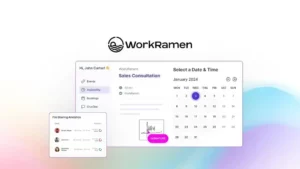Choosing the right software for service businesses enhances efficiency and customer satisfaction. Key considerations include automation features, integration capabilities, cost evaluation, and staying ahead of future trends like AI and cloud technology.
Software for service business has become essential in today’s competitive landscape. Finding the right tools can significantly impact productivity and customer satisfaction. As companies seek to innovate, understanding which software to implement is key. In this article, we’ll examine the critical features to look for, showcase the best solutions available, and discuss future trends shaping this industry.
What to Look for in Software for Service Businesses
When selecting software for service businesses, there are several key factors to consider to ensure you choose the right fit for your needs.
Identifying Your Business Needs
Begin by assessing the specific requirements of your business. This includes understanding the services you offer and what challenges you face. Do you need help with scheduling, invoicing, or customer management?
Functionality and Features
Look for software that provides essential features such as appointment scheduling, client communication tools, and reporting capabilities. These functionalities will streamline your processes and enhance efficiency.
User Experience and Accessibility
The software should have an intuitive interface that is easy for you and your team to navigate. Consider whether it is accessible on both desktop and mobile devices, as this can significantly impact day-to-day operations.
Integration with Existing Systems
Ensure that the software can integrate with the tools you already use. This helps prevent data silos and allows for seamless operation between various platforms.
Customer Support and Training
Evaluate the level of customer support available. Good software providers offer training resources and responsive customer service to help you address any issues quickly.
Top Software Solutions for Enhancing Customer Experience

Enhancing customer experience is crucial for any service business, and the right software solutions play a vital role in achieving this goal.
Online Booking Systems
Online booking systems simplify the process for customers to schedule appointments. These systems allow clients to book services at their convenience, reducing the chances of no-shows and improving satisfaction.
Customer Relationship Management (CRM)
A good CRM system helps you manage customer interactions effectively. It enables businesses to track customer preferences, purchase history, and communication, leading to personalized service and better relationships.
Feedback and Survey Tools
Gathering feedback is essential to improve services. Use tools that allow you to create surveys and gather customer insights. These can help identify areas that need attention and make customers feel valued.
Live Chat and Customer Support Software
Implementing live chat on your website can enhance customer satisfaction by providing instant responses to inquiries. This leads to improved engagement and quicker resolution of customer concerns.
Email Marketing Tools
Using email marketing software helps you stay connected with customers. For instance, sending personalized follow-ups after service can foster loyalty and encourage repeat business.
The Role of Integration in Service Business Software
Integration in service business software is essential for ensuring seamless operations and maximizing efficiency. When your software systems work together, they can enhance productivity and improve overall service delivery.
Streamlining Processes
Integrating various software applications allows for the automatic transfer of data between systems. This minimizes manual entries, reduces the risk of errors, and saves time. For example, connecting your scheduling software directly with your invoicing system can ensure that billing is accurate and timely.
Improved Data Management
With integration, businesses can centralize customer information, reducing data silos. A single view of customer data helps service providers understand client needs better and personalize offerings.
Facilitating Communication
Integration enhances communication between departments. For instance, if your customer service system is integrated with your CRM, support teams can quickly access customer histories during interactions, leading to more effective service.
Boosting Customer Satisfaction
When systems are well integrated, responses to customer inquiries and issues become faster and more accurate. This leads to higher customer satisfaction ratings as clients receive timely and relevant solutions.
Scalability for Future Growth
As a service business grows, integrated software systems are easier to expand or upgrade. New tools can be added to the network without disrupting existing operations, making it easier to adapt to changes in market demands.
Cost Considerations for Service Business Software

When evaluating service business software, understanding the costs involved is crucial. This helps ensure that you choose options that fit your budget while meeting your needs.
Upfront Costs
Many software solutions require an initial investment. Upfront costs can include licensing fees, installation expenses, and any hardware required to run the software. It’s important to assess these costs early in the selection process to avoid surprises.
Monthly or Annual Subscriptions
Many software companies offer subscription-based pricing models. This means you may pay a monthly or annual fee to use the software. Be sure to evaluate how this fits into your ongoing budget and whether it includes updates or support.
Hidden Costs
Look out for hidden costs that may not be immediately apparent. These can include fees for training, customer support, additional features, or integrations with other tools. Always read the fine print and ask about any potential extra charges.
Return on Investment (ROI)
Consider the potential ROI when investing in software. If the software enhances efficiency, saves time, and boosts customer satisfaction, it can lead to increased revenue. Calculate how quickly you expect to see a return on your investment.
Scalability and Future Costs
Finally, think about scalability. As your service business grows, your software needs may change. Ensure that the software you choose can grow with your business without incurring significant additional costs.
Future Trends in Service Business Software
The landscape of service business software is constantly evolving. Keeping an eye on future trends can help companies stay competitive and meet the changing needs of their customers.
Increased Automation
Future software solutions will focus more on automation. Features that automate routine tasks, such as scheduling and billing, will become standard. This allows service providers to spend more time on customer interactions rather than administrative duties.
Artificial Intelligence Integration
AI will play a larger role in service business software. From chatbots for customer service to predictive analytics that help forecast demand, AI will enhance decision-making and improve customer engagement.
Cloud-Based Solutions
Cloud technology will continue to dominate the market. Cloud-based software allows businesses to access their tools anytime, anywhere. This flexibility is crucial for service businesses that operate in different locations or have remote teams.
Enhanced Data Security
As cyber threats grow, so does the need for security in service business software. Future solutions will prioritize data protection features to ensure sensitive information remains secure and compliant with regulations.
User-Centric Design
Software will increasingly focus on user experience. A clean, intuitive design will be essential to help users navigate features quickly and effectively. This focus on usability can lead to greater adoption rates among staff and improved customer experiences.
Wrapping Up the Importance of Software for Service Businesses
Selecting the right software for service businesses is crucial for enhancing efficiency and customer satisfaction. As we have explored, understanding your specific needs, evaluating costs, and keeping an eye on future trends can help you make informed decisions.
Furthermore, leveraging automation, AI, and cloud-based solutions can significantly impact your service delivery. With the right tools in place, your business can thrive in today’s competitive market.
In conclusion, investing in effective software not only streamlines operations but also positions your service business for long-term success and growth.
FAQ – Frequently Asked Questions about Software for Service Businesses
What features should I look for in software for my service business?
Look for essential features like appointment scheduling, customer relationship management, and tools for billing and analytics to meet your business needs.
How does integration improve service business software?
Integration allows different software systems to communicate with each other, streamlining processes and improving data accuracy across your operations.
What are the benefits of using cloud-based software?
Cloud-based software offers flexibility, allowing you to access your tools from anywhere and often includes automatic updates, reducing maintenance efforts.
How can I evaluate the cost of service business software?
Consider upfront costs, monthly or annual subscriptions, potential hidden fees, and the expected return on investment to evaluate the overall cost effectively.
What future trends should I be aware of in service business software?
Keep an eye on trends like increased automation, AI integration, enhanced data security, and user-centric design, as these will shape the software landscape.
How can automation enhance my service delivery?
Automation helps reduce manual tasks, allowing your team to focus on customer interactions, ultimately improving efficiency and service quality.




